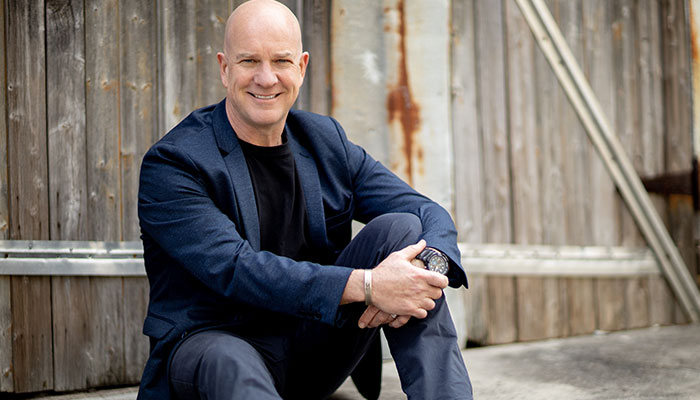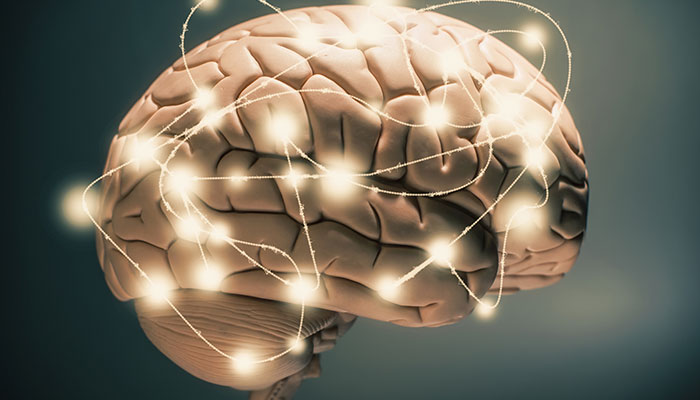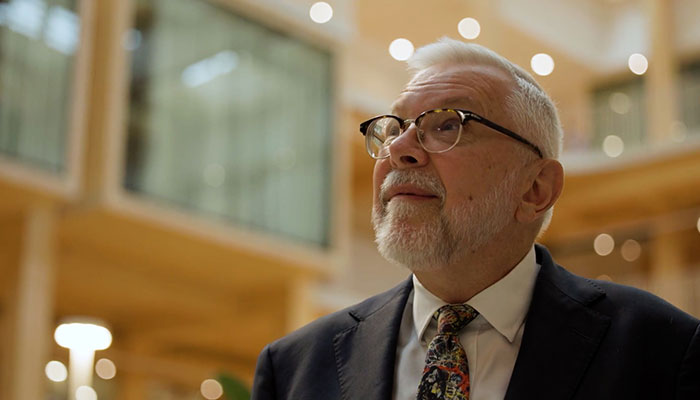Growing up in regional Victoria, Professor Mark Williams learned early that there were only two places to be: inside the circle and safe, or outside it and in danger.

Back to the future: Humans need to disconnect and embrace the offline life in order to feel connected, says neuroscientist Professor Mark Williams, pictured above.
“It was a very ‘white’ town, and not at all welcoming of perceived outsiders,” he says.
“In my first year of high school, a family arrived from Canada with a son my age, and he was bullied mercilessly. He looked like us, but he had an accent, and therefore he was different.
“He tried to make friends with me, but I told him in no uncertain terms to leave me alone.
“It was morally wrong, and it remains one of my greatest regrets, but at the time I didn’t feel able to defend him.
“I knew what happened to outsiders, and I did not want to be one. I needed to be part of that in‑group if I was going to get by.”
Now a cognitive neuroscientist, Professor Williams describes high school as an example of “a beautiful microcosm” of the world, because it shows how quickly groups are formed and how much our behaviour is influenced by the groups we belong to.
In his new book, The Connected Species, he argues that this ability to connect with others is what propelled humans into the position of the planet’s dominant species. He examines how we can harness the best parts of this adaptation to tackle the problems ranging from racism and inequality to global heating, while also providing a practical guide for anyone wanting to increase their own connections.
Why groups became important
Professor Williams says the shift towards forming groups helped foster the human talent for specialisation, allowing individuals to play to their strengths and advance the group’s shared knowledge instead of each person having to perform the same basic tasks for subsistence.
And while many species form cooperative groups of varying sizes, humans are the only ones to cooperate across groups.
“For example, one hive of bees won’t let another hive know that there are plenty of flowers nearby or that they have spare honey to share,” Professor Williams says.
“Connection is one of humanity’s greatest attributes, but it is also the reason for one of our most dreadful traits: discrimination.
“For there to be an 'in' group, there must also be an 'out' group, so with a sense of belonging also comes division.
“This drive to connect can help to explain many of the issues we see in our society today, including racism, sexism, fanaticism, extremism and nationalism.”
Knowing me, knowing you
Throughout human history, it has been important for us to be able to identify someone who was part of our group, often for safety reasons.
We need to break the hold technology industry has over our lives, reconnect and stop relying on it to teach and entertain our kids or to improve our lives, because that’s not its priority.
“Seeing someone who clearly did not belong to your group would be likely to activate the fight‑or‑flight instinct,” Professor Williams says.
“In small groups, it was simple enough to know who belonged and who didn’t, as we can easily recognise our parents, grandparents, siblings and children.
“As groups grew and joined, we would be less likely to know everyone personally, but we were still relying on working together towards common goals, so we could feel relatively safe in each other’s company.”
This is where a concept known as the ‘face template’ comes into play.

Wired to collaborate: In his new book, neuroscientist Professor Mark William says the human brain evolved to make connections with others to survive and thrive.
As we see more faces, we build up a model of an average group member based on characteristics like skin colour and facial features. Someone who fits your template is likely to be part of your group, and someone who does not may pose a threat.
However, the more different facial characteristics we see every day, the more varied our face template and the more our group expands. Because of this, people living in strongly multicultural societies are likely to be more accepting of difference.
Groups also form based on shared occupations or interests, leading their members to use other forms of shorthand to identify each other, such as uniforms in the military or team jerseys for sports fans.
Real life beats online
Until recently, most of our relationships were built on and maintained through face-to-face contact, allowing body language, touch and scent come into play and help build and reinforce the sense of connection.
Now, Professor Williams says, modern life is pushing us into online spaces where we are physically isolated: we have never been lonelier, and that is a conscious decision on the part of Big Tech.
“For example, Trent Harris, who used to work at Facebook, has said that he thought he was designing a platform that was about being more social,” he says.
“But when he suggested adding a function to help people meet up when they were in the same city, Facebook didn’t want that. That would take people away from their screens.
“This is just one way that these companies are dividing us instead of bringing us together.
“Their algorithms are highlighting our differences instead of our similarities, and it’s having a negative impact on our mental health and our wellbeing, not only as individuals but as a society.”
Finding your tribe again
As we saw during the COVID-19 pandemic, people from disparate groups can come together to support each other and work towards a common goal.
- Protecting parks, pools and playgrounds: new think tank launched
- Please explain: Why do magpies swoop?
Professor Williams is optimistic that we can achieve true human connection again and use it to tackle our global challenges.
“We need to break the hold the tech industry has over our lives. We need to reconnect on a real level across generations and stop relying on it to teach and entertain our kids or to improve our lives, because that’s not its priority," Professor Williams says.
“The first step is to let your loved ones know that they need to call you if something is urgent, then turn off all your notifications – email, social media, messenger apps, everything.
“We have to connect face to face, in the real world, so we can all thrive.”
Mark Williams is an Honorary Professor in the School of Psychological Sciences at Macquarie University.
The Connected Species: How the Evolution of the Human Brain Can Save the World is published by Rowman and Littlefield.



